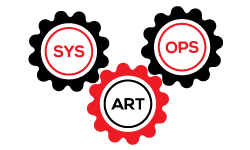
The roles of system administrators in an organization have evolved greatly over the years.
Sysadmins no longer operate in isolation but are right at the center of day-to-day activities in an organization.
Sysadmins play different roles in an organization not only depending on their experience and department size but also the availability and roles played by other tech professionals like network administrators, database administrators, security professionals, and technical support engineers.
But typical system administration tasks include troubleshooting, server configuration, doing backups, and other related tasks. One minute a sysadmin maybe fine-tuning a web server and the next minute installing a multimedia application for the HR manager.
Because many organizations depend heavily on networked computers, system administrators may find themselves working for long hours making sure mission-critical systems are up and running throughout.
Becoming a System Administrator
Below are the steps that we think one should take when considering to venture into system administration as a career.
• Acquire the necessary education
Although a bachelor’s degree in computer science or any related field is not a necessity to break into system administration, having it proves a real asset given the competitive nature of the job market.
Some employers will however take you in if you have the equivalent years of work experience.
• Complete an Internship
An internship provides you with the perfect opportunity to compare what is taught in class and what is actually required in the job market.
It is well known that the gap between these two can be quite huge. The knowledge you gain during an internship allows you to acquire industry skills and knowledge while you are still in school.
Most of these positions also offer job training and thus allows you as a potential system administrator to become familiar with the work setting and the roles.
• Find a System Administration Position
Once you are done with your degree and you have completed your internship program, find an entry level position in system administration.
This role will give you a chance to learn from experienced professionals. You will also gain work experience which will come with more career opportunities.
One can learn so much from seasoned system administrators especially when it comes to dealing with real world challenges.
• Consider a professional certification.
It is very important to consider getting a professional certification. Check out the benefits of having a professional certification here and the different certifications that you can do here.
• Stay up to date with the latest technologies
Given the fast pace of the IT industry, you need to stay up to date with the advancements in technology .
This can be accomplished through continued education like a Master’s degree program , subscribing to journals and magazines from renowned software vendors and online communities.
That’s pretty much how most of us here at Linux Nimbus got into system administration. It has been quite an enjoyable journey so far.
Check out a detailed career story from our co-founder and renowned author here

I can’t over emphasise on the importance of internship and entry level jobs. You need to be able to make errors when there’s someone there to help you sort it. Good sysadmins are experience. Experience comes from making errors.